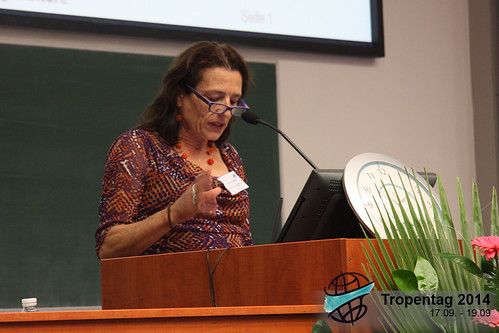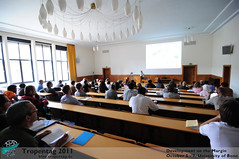development
Interview with Michael Hauser: Transformative Change
Tue, 09/23/2014 - 16:27 — Jose Jara
Michael Hauser: “we are dealing with a systemic challenge” by Juan José Egas
Video Interview
From lab to field - speech of Christel Weller-Molongua
Wed, 09/17/2014 - 19:56 — Vitalii Korol Christel Weller-Molongua
Deutsche Gesellschaft für Internationale Zusammenarbeit (GIZ) Gmbh, Germany
Christel Weller-Molongua
Deutsche Gesellschaft für Internationale Zusammenarbeit (GIZ) Gmbh, GermanyWe are social actors and not only homo economicos!
Tue, 10/09/2012 - 13:28 — De-Registered User
"Do poor people need western ways to develop?Are these communities aware of their surroundings? Can they take risks?"
 Whenever we mention rural communities, the discussion focuses on how backward they may be and the need for infrastructure that would make their lives better. At the Tropentag this year, the discussions in the parallel session on rural development focussed on Risks and investments on the rural communities. Are these rural communities aware that they face certain risks? Are they risk averse? Are they well prepared in times of stress, shocks and crises that their systems face?
Whenever we mention rural communities, the discussion focuses on how backward they may be and the need for infrastructure that would make their lives better. At the Tropentag this year, the discussions in the parallel session on rural development focussed on Risks and investments on the rural communities. Are these rural communities aware that they face certain risks? Are they risk averse? Are they well prepared in times of stress, shocks and crises that their systems face?
 Whenever we mention rural communities, the discussion focuses on how backward they may be and the need for infrastructure that would make their lives better. At the Tropentag this year, the discussions in the parallel session on rural development focussed on Risks and investments on the rural communities. Are these rural communities aware that they face certain risks? Are they risk averse? Are they well prepared in times of stress, shocks and crises that their systems face?
Whenever we mention rural communities, the discussion focuses on how backward they may be and the need for infrastructure that would make their lives better. At the Tropentag this year, the discussions in the parallel session on rural development focussed on Risks and investments on the rural communities. Are these rural communities aware that they face certain risks? Are they risk averse? Are they well prepared in times of stress, shocks and crises that their systems face?
Studies conducted in Burkina Faso by Lucrezia Ticani indicate that these communities are much more aware of their environment and have devised different strategies to survive the wet and dry seasons while still being able to take some risk and minimise the risk.
To Feed or not to Feed?
Fri, 10/07/2011 - 11:25 — De-Registered User
The Tropentag 2011 Thematic Presentations on Animal Production Systems discuss various trade-offs between different animal feeds and feeding practices. The livestock in question ranged from cattle to shrimp and even guinea pigs!
 Presentations on Animal Production Systems at Tropentag 2011.
Transforming to Integrated Ecosystems
The common thread through all the presentations was how to integrate livestock production into the natural environment. Sustainable aquaculture that aims at minimizing impact on the environment can in the long run provide farmers with much better livelihoods. We were presented with some great use of Google map imaging depicting the boundaries of land usage and how livestock production can be integrated without degrading the environments around it. A ratio between environmental land coverage and live stock land usage enforces the ongoing theme of 'doing more with less'.
Presentations on Animal Production Systems at Tropentag 2011.
Transforming to Integrated Ecosystems
The common thread through all the presentations was how to integrate livestock production into the natural environment. Sustainable aquaculture that aims at minimizing impact on the environment can in the long run provide farmers with much better livelihoods. We were presented with some great use of Google map imaging depicting the boundaries of land usage and how livestock production can be integrated without degrading the environments around it. A ratio between environmental land coverage and live stock land usage enforces the ongoing theme of 'doing more with less'.
 Presentations on Animal Production Systems at Tropentag 2011.
Transforming to Integrated Ecosystems
The common thread through all the presentations was how to integrate livestock production into the natural environment. Sustainable aquaculture that aims at minimizing impact on the environment can in the long run provide farmers with much better livelihoods. We were presented with some great use of Google map imaging depicting the boundaries of land usage and how livestock production can be integrated without degrading the environments around it. A ratio between environmental land coverage and live stock land usage enforces the ongoing theme of 'doing more with less'.
Presentations on Animal Production Systems at Tropentag 2011.
Transforming to Integrated Ecosystems
The common thread through all the presentations was how to integrate livestock production into the natural environment. Sustainable aquaculture that aims at minimizing impact on the environment can in the long run provide farmers with much better livelihoods. We were presented with some great use of Google map imaging depicting the boundaries of land usage and how livestock production can be integrated without degrading the environments around it. A ratio between environmental land coverage and live stock land usage enforces the ongoing theme of 'doing more with less'.
"Increase production on all levels" and let the mass develop working solutions. Keynote Discussion Part 3/3
Fri, 10/07/2011 - 10:51 — De-Registered User"What you're calling marginal is political opposition" Keynote Discussion Part 2/3
Fri, 10/07/2011 - 09:06 — De-Registered UserRattan Lal, Sir Gordon Conway and Paul Richards on how to include small holders into carbon trade. Keynote Discussion Part 1/3
Thu, 10/06/2011 - 17:18 — De-Registered User
Worldbank sets a minimum amount of 2 Mio. € for carbon trade. That avoids small scale farmers from taking advantage of this trading scheme. Hear about the ideas of Rattan Lal, Sir Gordon Brown and Paul Richards!
This is part 1 of a series of videos.
Part 2: "What you're calling marginal is political opposition" Keynote Discussion
Part 3: Solutions to help people improve their situation, Rattan Lal, Sir Gordon Conway and Paul Richards discuss
The illusion of marginality
Wed, 10/05/2011 - 19:54 — De-Registered User Marginal people?
No creature is marginal to its own existence. Marginalisation is just a concept incorporated to our “social taxonomy” according to Prof. Paul Richards.
Prof. Paul Richards (Technology and Agrarian Development) from the Wageningen University, argues that in ecology and evolutionary there is no such thing as “marginal people.” Everything has its own place. He argues that the creation of “marginal people” is just a reflection of the human need to classify its environment. It is also a reflection of our capacity to produce insidious harm based on our lack of trust on the others ("I trust myself more than I trust others, I can blame other more than I blame myself").
Prof. Richards argues that in early medieval times most social misfortunes were attributed to the unfitness of the rulers (they were accused for either not being able to do their work or to follow God’s desires), and that rulers were often “marginalised” from common society. This started to change during the later medieval period (the beginning of the market economy), when the blame shifted from elites to certain minorities.
Marginal people?
No creature is marginal to its own existence. Marginalisation is just a concept incorporated to our “social taxonomy” according to Prof. Paul Richards.
Prof. Paul Richards (Technology and Agrarian Development) from the Wageningen University, argues that in ecology and evolutionary there is no such thing as “marginal people.” Everything has its own place. He argues that the creation of “marginal people” is just a reflection of the human need to classify its environment. It is also a reflection of our capacity to produce insidious harm based on our lack of trust on the others ("I trust myself more than I trust others, I can blame other more than I blame myself").
Prof. Richards argues that in early medieval times most social misfortunes were attributed to the unfitness of the rulers (they were accused for either not being able to do their work or to follow God’s desires), and that rulers were often “marginalised” from common society. This started to change during the later medieval period (the beginning of the market economy), when the blame shifted from elites to certain minorities.




